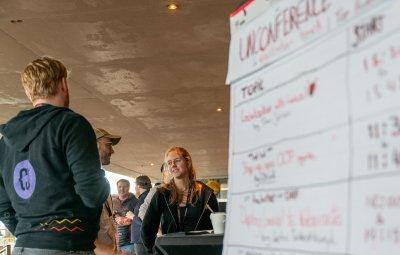Larry Garfield is a prominent speaker in the PHP community and has a lot of experience delivering talks. He’s one of the many top speakers that attended this conference. And, well, the message is quite clear: never* use arrays.
(*) in public
Why? Because it’s kind of a hack. Because values are not guaranteed to be of the same type. Because they have poor performance. And because PHP doesn’t have them... *gasp*
What Larry means is that the definition of an “array” is an ordered sequence of values of the same type, while in PHP arrays are associative arrays without type guarantees. Numeric arrays, where you don’t provide the key in the assignment, are a hack and behave weird (the keys are not always sequential).
Then he mentioned one of the greatest bugs of the last few years, namely Drupageddon (2014), which was also due to some code expecting numerical keys, but was (in certain conditions) causing an SQL injection risk.
So… What’s better? Purpose-built data structures! Do you know where he’s getting at? Yep, objects of course. And that’s where PHP has already everything you need. Did you know there’s an ArrayObject? Extend it to create a “TypedArray”. Or use the IteratorAggregate, Countable and Traversable interfaces to create sequences, sets, etc. They can be made to be unique, ordered, typed and everything you want.
But objects are slower, right? Nope…
|
Technique |
Runtime (s) |
Memory (bytes) |
|
Associative array |
9.4311 (n/a) |
541,450,384 (n/a) |
|
stdClass |
11.2173 (+18.94%) |
589,831,120 (+8.94%) |
|
Public properties |
8.2172 (-12.87%) |
253,831,584 (-53.12%) |
|
Private properties |
11.0881 (+17.57%) |
253,833,000 (-53.12%) |
|
Anonymous class |
8.1095 (-14.07%) |
253,832,368 (-53.12%) |
Check Larry’s slides for the benchmark he used, but the conclusion above is mind-blowing.








